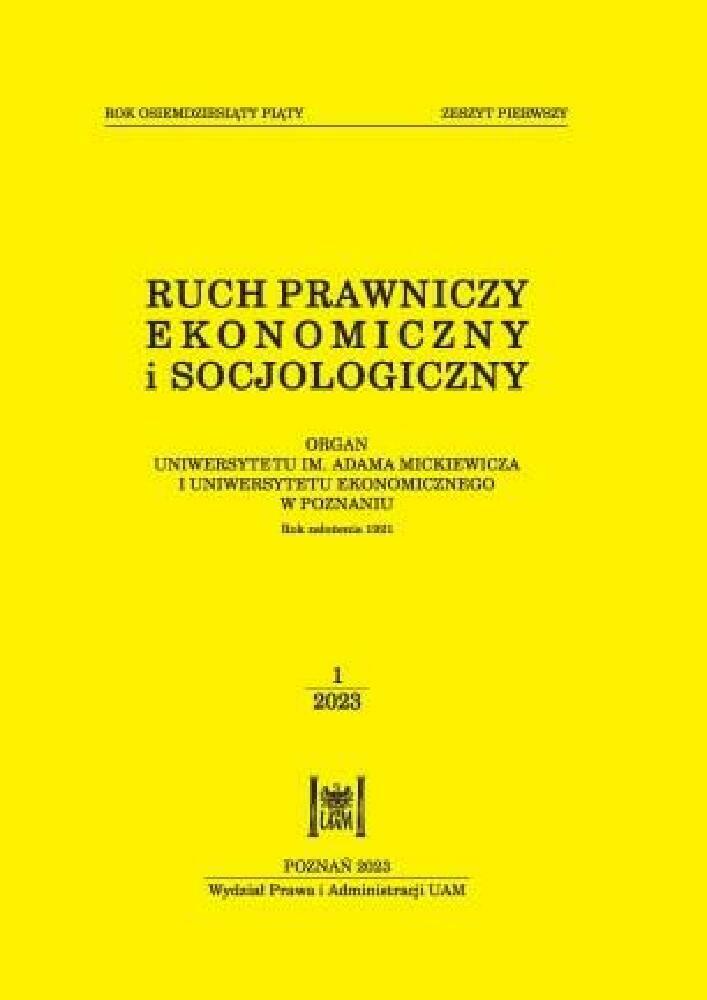Abstrakt
In recent years, the approach to the functions of law in economy has significantly changed and is perceived more and more often as a tool (instrument) to accomplish various strategic goals of development policy. The aim of the paper is to discuss such legislative efforts as the latest and, given the EU perspective, the most interesting examples of instrumentalizing public procurement through the implementation of the ‘local content’ concept. Key observations from characterization of the US and South Africa relevant regulations were considered with respect to the legal environment in the EU and Poland. The main goal of this paper is to advance conclusions concerning the legal framework in which enacting local content requirements (LCRs) would be acceptable in the light of EU law. The paper shows that the applying of LCRs in public procurement procedures may be permitted in the EU, albeit to a limited extent. In the tender procedures taking place in the EU Member States, such solutions must respect the principle of proportionality in line with the EU public procurement law, stem from objectively justified needs of the contracting authority and – in all certainty – cannot pursue protectionist interests by limiting access to the procedure for contractors who do not meet certain LCRs.
Bibliografia
Arrowsmith, S., Kunzlik, P. (2009). Social and Environmental Policies in EC Procurement Law: New Directives and New Directions. Cambridge. DOI: https://doi.org/10.1017/CBO9780511576041
Benedict, Ch. (2000). Sekundärzwecke im Vergabeverfahren. Heidelberg. DOI: https://doi.org/10.1007/978-3-642-57100-8
Borucka-Arctowa, M. (ed.) (1982). Społeczne poglądy na funkcje prawa. Wrocław–Warsaw–Kraków–Gdańsk–Łódź.
Caranta, R., Trybus, M. (2010). The Law of Green and Social Procurement in Europe. Copenhagen.
Drake, C. (2022). How Build America: Buy America Guidance Strengthens Made in America Requirements. https://www.whitehouse.gov/omb/briefing-room/2022/04/20/how-build-mericabuy-america-guidance-strengthens-made-in-america-requirements/ [Accessed 1 February 2023].
Hettne, J. (2013). Strategic Use of Public Procurement – Limits and Opportunities. European Policy Analysis 7: 1–20.
Horubski, K. (2021). Socio-ecological instrumentalization and the economic objectives of public procurement law. Ekonomia XXI Wieku 24: 27–38. DOI: https://doi.org/10.15611/e21.2021.02
Kania, M.A. (2021). Rola zamówień publicznych w tzw. „Zielonej transformacji’’. Studia Prawnoustrojowe 53: 271–285. DOI: https://doi.org/10.31648/sp.6628
Kokocińska, K. (2014). Prawny mechanizm prowadzenia polityki rozwoju w zdecentralizowanych strukturach władzy publicznej. Poznań.
Kokocińska, K. (2018). Wspieranie rozwoju działalności gospodarczej w ujęciu zasad i wartości. Ruch Prawniczy, Ekonomiczny i Socjologiczny 80(4): 41–53. DOI: https://doi.org/10.14746/rpeis.2018.80.4.4
Kokocińska, K. (2019a). Integrated programming in national development. Ruch Prawniczy, Ekonomiczny i Socjologiczny 81(4): 139–150. DOI: https://doi.org/10.14746/rpeis.2019.81.4.11
Kokocińska, K. (2019b). Rozdział I: Spójność działań organów władzy wykonawczej na rzecz rozwoju (na przykładzie sektora elektromobilności). In K. Kokocińska, J. Kola (eds.), Prawne i ekonomiczne aspekty rozwoju elektromobilności (pp. 3–17). Warsaw.
Kola, J. (2020). Public procurement as a tool of conducting development policy in emerging markets: the example of Poland. In G. Quinot, S. Williams-Elegbe (eds.), Public Procurement Regulation in Africa: Development in Uncertain Times (pp. 249–269). Durban–Johannesburg–Cape Town.
Kola, J. (2021). Koncepcja local content w systemie zamówień publicznych. In K. Kokocińska (ed.), Publicznoprawne aspekty udziału sektora MŚP w procesie realizacji strategicznych celów polityki rozwoju (pp. 145–162). Poznań. DOI: https://doi.org/10.14746/amup.9788323240051.007
McCrudden, Ch. (2007). Buying Social Justice: Equality, Government Procurement, & Legal Change. Oxford. DOI: https://doi.org/10.1093/acprof:oso/9780199232420.001.0001
OECD (2015). Green Finance and Investment: Overcoming Barriers to International Investment in Clean Energy. Paris.
OECD (2019). Local Content Requirements. Trade Policy Brief, February 2019.
Ovadia, J.S. (2015). The role of local content policies in natural resources-based development. Österreichische Forschungsstiftung für Internationale Entwicklung. Rohstoffe und Entwicklung (pp. 37–45). Wien.
Popowska, B. (2006). Klasyfikacja funkcji administracji w nauce publicznego prawa gospodarczego. In B. Popowska (ed.), Funkcje współczesnej administracji gospodarczej. Księga dedykowana Profesor Teresie Rabskiej (pp. 61–85). Poznań.
Rabska, T. (1993). Jakie prawo gospodarcze? Próba odpowiedzi. Ruch Prawniczy, Ekonomiczny i Socjologiczny 55(1): 19–25.
Sjåfjell, B., Wiesbrock A. (2015). Sustainable Public Procurement under EU Law: New Perspectives on the State as Stakeholder. Cambridge. DOI: https://doi.org/10.1017/CBO9781316423288
Sołtysińska, A. (2000). Instrumentalizacja zamówień publicznych – rozważania na tle unormowań prawa wspólnotowego. In S. Biernat (ed.), Studia z prawa Unii Europejskiej (pp. 373–385). Kraków.
Szydło, M. (2014). Prawna koncepcja zamówienia publicznego. Warsaw.
Warner, M. (2011). Local Content in Procurement. Creating Local Jobs and Competetive Domestic Industries in Supply Chains. London–New York.
Wronkowska-Jaśkiewicz, S. (2017). Uwagi o instrumentalności, instrumentalizacji i autonomii prawa. In J. Zimmermann (ed.), Aksjologia prawa administracyjnego. Vol. 1 (pp. 25–36). Warsaw.
Ziembiński, Z. (1980). Problemy podstawowe prawoznawstwa. Warsaw.
Licencja
Prawa autorskie (c) 2023 WPiA UAM

Utwór dostępny jest na licencji Creative Commons Uznanie autorstwa 4.0 Międzynarodowe.





